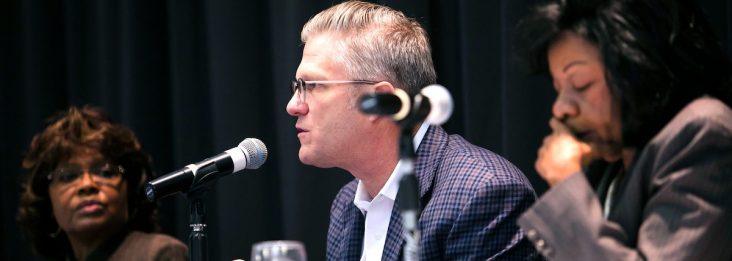UAFS panel notes need for diversity, ‘respectful dialogue’ on race relations
by January 19, 2016 4:16 pm 319 views

Steve Clark speaks during the panel discussion, while Dr. Georgia Hale, left, and Charolette Tidwell look on.
Editor’s note: Story info submitted by the University of Arkansas at Fort Smith.
–––––––––––––
Rep. George McGill, D-Fort Smith, leaned into the microphone and used an example from his past to make a point about Fort Smith’s future. McGill recalled when former Arkansas Governor Winthrop Rockefeller sought to make state government more racially diverse.
“He made a bold move to change the complexion of government,” McGill said. “It was the first time in Arkansas history that African Americans were given positions in government. They were now to play roles in decision making. They were made heads of departments.”
McGill, along with three other panelists, discussed issues facing the United States in front of a crowd of more than 400 people gathered at the University of Arkansas at Fort Smith for “The Letter: A Fort Smith Community Forum,” a community breakfast held Jan. 18 commemorating the legendary civil rights leader Martin Luther King Jr.
McGill spoke of Rockefeller when asked about the best method to reduce economic inequality, as an example of the importance of making more opportunities available to minorities.
“I encourage all of you to do a self-examination of your organization. Do an honest assessment and ask yourself: does this look right?” McGill continued. “I was one that benefited from a new mindset that we’re going to share opportunity. We’re going to make a difference. If we want African Americans in the community to strive and survive and be responsive and be supportive, let’s give them meaningful job opportunities.”
Steve Clark, founder and chief executive officer of Propak Logistics; Dr. Georgia Hale, provost and vice chancellor for academic affairs at UAFS; and Charolette Tidwell, co-founder and director of Antioch Consolidated Association for Youth & Family; sat alongside McGill as panelists.
Clark stressed the importance of honest dialogue when facing racial conflicts, on and off college campuses.
“From time to time, we’re afforded windows of opportunity, and I think what is happening on our college campuses is just that,” Clark said. “If we give ourselves the opportunity to face one another – to have open, respectful dialogue – reasonable men and reasonable women will come to reasonable conclusions. Healthy debate is helpful for all of us.”
The discussion covered an expanse of topics, from the role of religion in social change to the importance of education in improving one’s life. When asked about the latter, Hale said that “we have to have an education about getting an education.”
“We have a lot of first-generation students, so we need to start letting the parents know the value of education,” Hale said. “Does everybody need a four-year degree? I don’t think so. For a lot of high-paying jobs, you can get the skillset here [at UAFS] through two-year degrees and certificates. But some kind of education beyond high school is absolutely imperative.”
Following a question on improving the relationship between police and the community, Tidwell encouraged the local youth to become more involved in their community and to not be passive when facing injustices.
“When there are injustices, somebody has got to be the adult in the room and bring the issue to the forefront,” Tidwell said. “If we believe in our Constitution, in our Declaration of Independence, if we truly believe in them, we will not stand by the wayside.”
The discussion was moderated by Rodney Parks, senior director of major and planned gifts at UAFS. Following the panel discussion, the crowd participated in a symbolic march around campus ending at the Donald W. Reynolds Bell Tower on campus, where the event concluded with remarks by Chancellor Dr. Paul Beran.
Also, Dr. Leroy Cox, associate professor in the Bachelor of Applied Science program, announced the creation of the Martin Luther King Jr. Scholarship at UAFS, created in partnership with the MLK Community Association. The scholarship will go to a graduating high school senior or continuing UAFS student who resides in either Sebastian, Crawford, Sequoyah or LeFlore County. For more information about the scholarship, contact the UAFS Foundation at 479-788-7029 or Bruce Wade, chair of the MLK Committee Association, at 479-739-7904.
